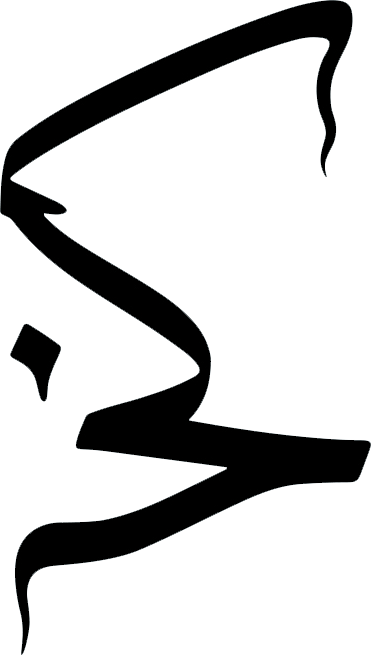Fishing
by Hamza Bilbeisi
Oririnal artwork by Dilan Arslan.
I found out Khalo was broken when I was about eleven. The family was at his house to visit and Mama had my hand tightly in hers. I broke away from her grasp and ran to the study. The door was hinged open and I don’t think she realized I let go. She was in one of those half-hearted chats with Khalto that leave you between occupying the conversation and your surroundings. Neither is present enough. Khalo’s study was never locked, even after his frequent visits to the hospital, and I wandered in from time to time to flip through dusty books filled with barely-legible handwriting.
I was surprised to find him sitting at his desk without his caretaker. His eyes were fixed on nothing in particular outside the window, and he had a tattered notebook with relaxed pages laid flat in front of him. He must have heard me come in because he smiled before turning his gaze to me. I hadn’t spoken to him directly in years, so it surprised me when he asked if I wanted to hear a story. I had no choice except to let everything unfold as he liked. The door’s edge was still in my hand, and my feet were stubborn; they would not move. He kept referring to his book as he told his story with vacant eyes. He said it was his old journal.
The waves could have swallowed my entire boat. You know, I built the boat myself. I liked doing things like that, with my hands. I never had any trouble with the sea either. I understood its rhythm. There were the few minor incidents, mostly to do with my engine or the length of my fishing line, and I did some quick patch-up work once. But that one day I was consumed by the water’s anger. The sea seemed calm further out, I promise you. Can the sea choose a victim? I still think about that now.
The entire sky went grey, like a reflection of the displeased sea. The water barely eased itself onto me, it was a rushed nightmare. I turned off my engine and gripped the sides of my boat. I promise you no engine would have stood a chance against what I saw. I threw my fish overboard and prayed for Allah to spare me. The waves would clap against my boat, then lift up to try and devour me from the other side. Of course I was scared; it was the type of fear that settles you closer to the comfort of your own mortality. Not out of will, but the dwindling options. Every time the boat completely filled with water and I braced myself for an end, another wave would strike my boat to empty all the seawater, and I was forced to endure my preparation from the start. The indecisive pull between hope and despair that I felt on the cusp of death might have been worse than the storm itself.
It began to rain in fistfulls as well. Water is strange. It will unwind your nerves when you submerge, but will melt you down under the torrential downpour of rain and waves. Always be wary of where you place your trust. The sea was my friend and in an instant it stripped me of myself. I have yet to get my vengeance—
He began coughing heavily and stopped to take a sip of water. He readjusted his glasses, but only to look up from his book. He stopped talking. He was like this sometimes.
Khalo didn’t come after me when I shuffled out, but I heard him carry on narrating his story moments after I left his study. He was speaking as if I was still standing opposite him. I sat down and held Mama’s hand tight again. I don’t think she realized I ever let go. When we left his house to drop Khalto off then go home, I told Mama what happened. She laughed and told me Khalo was never a fisher. She pinched my cheek and told me he had a tendency to tell tall tales about water, and that it was important to visit him nonetheless because it was lonely for him. She said family is important, so we should be patient with Khalo.
Just over a year passed, and I was cleaning up after dinner when they told me Khalo passed away. He died in his bathtub the evening I found out. It was a strange incident, and they shrugged it off as an ‘unfortunate result of his unpredictable behavior’. They found no sign of resistance. The bathtub was barely filled with water and he was lying, completely composed, with his head just slightly underwater. The curtain and floormat remained neatly in place. However, all four bathroom walls and the ceiling were drenched in water when the caretaker found him.
Hamza Bilbeisi is a short fiction writer from Amman, Jordan. He explores an Arab futurism through concepts like localized mythologies, magical realism and oral histories. He primarily distributes his work via Twitter (@ketabhamza) and Medium.

